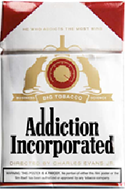University Communications and Marketing
Documentary film sheds light on the tobacco industry’s attempts to silence an industry whistleblower
January 23, 2014
Contacts:
Triniti Halverson, Student Health Services, 657-2157 or trinity.halverson@msubillings.eduUniversity Relations, 657-2269
Documentary screening featuring tobacco industry scientist and whistleblower on Tuesday, Feb. 18, 6:30 p.m., in the Library building room 148.
MSU BILLINGS NEWS SERVICES — Critically acclaimed for its riveting story of the tobacco industry’s lies and attempts to silence the scientist who blew the whistle on the industry, the documentary film “Addiction Incorporated” will be screened at Montana State University Billings on Feb. 18.
 The film conveys how Dr. Victor DeNoble, a former Philip Morris research scientist,
became one of the most influential whistleblowers in history, testifying before Congress
about his findings on the addictive nature of nicotine.
The film conveys how Dr. Victor DeNoble, a former Philip Morris research scientist,
became one of the most influential whistleblowers in history, testifying before Congress
about his findings on the addictive nature of nicotine.
DeNoble discovered that a trace ingredient in tobacco smoke amplified the narcotic effects of nicotine. By tweaking the formula, DeNoble could cause lab rats to press a dosing lever up to 90 times a day.
When DeNoble tried to publish his findings in an academic journal, his employer invoked a secrecyclause, fired the scientist and killed the story.
Years later, dogged journalists sniffed a story and tracked down DeNoble, who agreed to meet under cloak-and-dagger circumstances. Together they unearthed the buried evidence and gave it to the feds. In 1994, Congress held hearings where the heads of thetobacco companies replied in unison that their products were not addictive.
The hearings ultimately resulted on passage of the Family Smoking Prevention and Tobacco Control Act of 2009 and the tobacco companies’ settlement of billions of dollars paid to states to recoup some of the money the spent on treated addicted, ill smokers.
A New Your Times film critics pick, “Addiction Incorporated,” is a strong and thought-provoking film that tobacco-prevention advocates find inspirational.
Dr. Sarah Keller, MSUB associate professor in the Department of Communications and Theater, will introduce the film with a discussion about the effect public relations, a free-market economy and corporate advertising has on public health voices.
“Enshrouded in the ideology of freedom of speech, we allow corporations a reckless disregard for personal well-being and public health,” Keller says. “This is further enhanced by our zealous ideology of individual responsibility. What remains left unsaid in the public conversation about market regulations is the fact that public health voices are drowned out by media produced with bigger and better corporate budgets. Is this the marketplace of ideas we want for our country?"
Sponsored by MSU Billings Student Health Services and the MSUB Library, the event is free and open to the public on Feb. 18, 6:30 p.m., in the Library building room 148.
